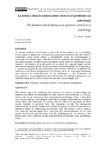La teoría crítica feminista como correctivo epistémico en psicología

View/
Use this link to cite
http://hdl.handle.net/2183/26966
Except where otherwise noted, this item's license is described as Atribución-CompartirIgual 4.0 España
Collections
Metadata
Show full item recordTitle
La teoría crítica feminista como correctivo epistémico en psicologíaAlternative Title(s)
The Feminist Critical Theory as an Epistemic Corrective in PsychologyAuthor(s)
Date
2019Citation
García Dauder, S. (2019). La teoría crítica como correctivo epistémico en psicología. Atlánticas. Revista Internacional de Estudios Feministas, 4 (1), 117-150. https://doi.org/10.17979/arief.2019.4.1.4843
Abstract
[Resumen] El artículo comienza analizando la situación de las mujeres en la psicología (como sujetos y objetos de conocimiento); para posteriormente abordar cómo el feminismo, como teoría crítica y movimiento social, ha transformado la psicología. En primer lugar, describe cómo las pioneras psicólogas utilizaron sus conocimientos científicos para desmontar mitos sobre la inferioridad de las mujeres y los efectos de la educación en su salud. En segundo lugar, analiza cómo los feminismos de los 70 denunciaron el androcentrismo en salud mental y crearon los grupos de auto-conciencia como formas colectivas de politizar los malestares con efectos terapéuticos. Por último, cómo las psicólogas feministas han criticado la esencialización de las diferencias y los dualismos de sexo/género y la patologización de la diversidad. El artículo termina con una reflexión sobre las relaciones entre el feminismo y la psicología hoy. [Abstract] The article begins by analyzing the situation of women in psychology (as
subjects and objects of knowledge); to later address how feminism, as a critical
theory and social movement, has transformed psychology. First, it describes
how the pioneering psychologists used their scientific knowledge to dismantle
myths about the inferiority of women and the effects of education on their
health. Second, it analyzes how the feminisms of the 70s denounced
androcentrism in mental health and created the groups of self-consciousness as
collective forms of politicizing discomforts with therapeutic effects. Finally,
how feminist psychologists have criticized the essentialization of sex and
gender differences and dualisms and the pathologization of diversity. The
article ends with a reflection on the relations between feminism and psychology
today.
Keywords
Psicología
Mujeres
Salud mental
Epistemología
Psychology
Feminism
Women
Mental health
Epistemology
Mujeres
Salud mental
Epistemología
Psychology
Feminism
Women
Mental health
Epistemology
Editor version
Rights
Atribución-CompartirIgual 4.0 España
ISSN
2530-2736






